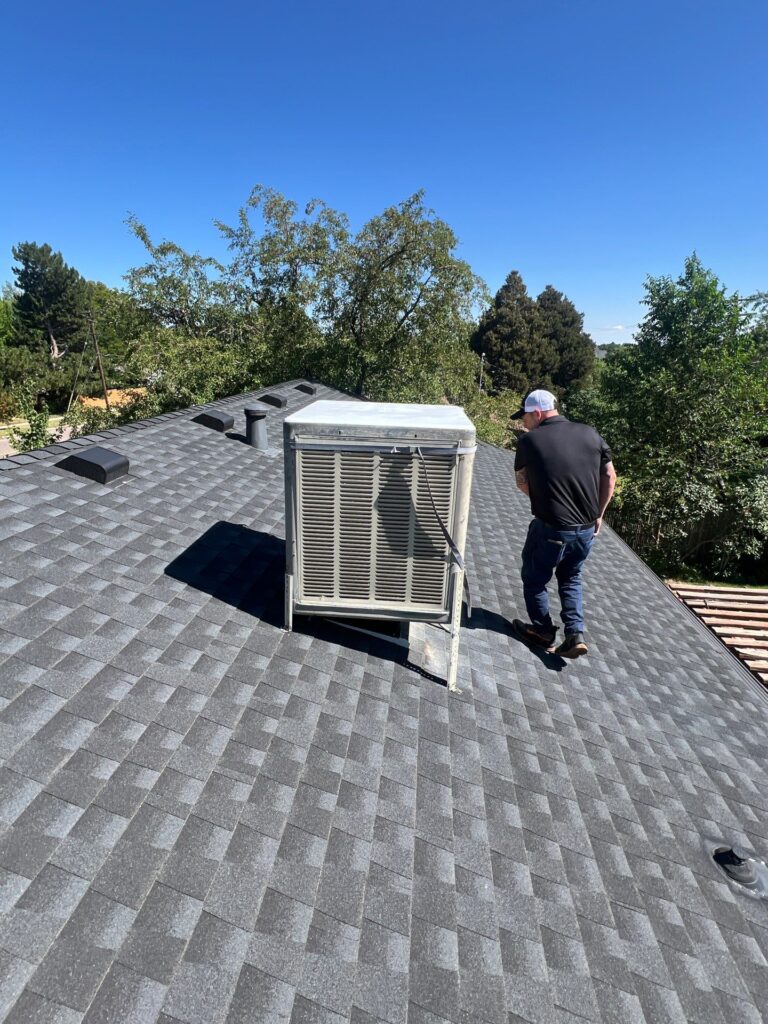
Understanding Colorado’s Roofing Challenges
Homeowners in Denver, Colorado, face some of the most demanding weather conditions in the country—ranging from intense UV exposure and drastic temperature swings to heavy snowfall and frequent hailstorms. Selecting the right roofing material is not only a design choice but also a critical step in securing your home’s structural integrity and energy efficiency.
1. Asphalt Shingles: Affordable and Widely Trusted
Asphalt shingles remain one of the most widely installed roofing materials for a reason. They offer a balance of cost-efficiency, easy installation, and adequate durability suited for many residential properties.
Key Features:
- Lifespan: 15–30 years depending on quality
- Weather Resistance: Moderate resistance to hail and wind
- Styles Available: Architectural, 3-tab, and luxury varieties
- Maintenance: Minimal; periodic inspections recommended
Best For: Homeowners seeking a budget-friendly solution with decent weather protection and quick installation.
2. Metal Roofing: Engineered for Harsh Colorado Conditions
Metal roofing is gaining ground among roofers in Denver for its superior performance in high-stress climates. Designed to reflect solar radiation and withstand hail, metal roofs offer longevity and sustainability in one package.
Advantages:
- Durability: Up to 70 years with minimal upkeep
- Energy Efficiency: Reflective coatings reduce cooling costs
- Snow Shedding: Sloped panels prevent snow accumulation
- Environmental Impact: Often made from recycled materials
Considerations: Higher initial investment, but lower lifetime costs. May require insulation to reduce noise.
3. Slate Roofing: Timeless Elegance with Maximum Longevity
Slate roofs offer an elite level of protection while elevating a home’s appearance. Natural stone tiles resist fire, moisture, and pests—ideal traits for long-term peace of mind.
Performance Metrics:
- Lifespan: Over 75 years
- Fire Resistance: 100% non-combustible
- Aesthetic: Rich, natural tones with a textured finish
- Weight: Requires reinforced roof structure
Drawback: Installation is complex and costly, suitable for homes already designed to support heavy materials.
4. Clay and Concrete Tiles: High-End Durability with Southwestern Charm
Popular in arid and sunny regions, clay and concrete tiles are viable in Denver’s climate due to their insulating properties and ability to withstand high UV levels.
Core Benefits:
- Heat Resistance: Keeps attic temperatures low in summer
- Lifespan: 40–60 years
- Style Options: Spanish, mission, and modern profiles
- Fire and Pest Resistant: Non-organic materials reduce fire and rot risks
Note: Their weight requires professional assessment of the roof’s load-bearing capabilities.
5. TPO, EPDM, and PVC: Best for Flat Roof Systems
For homes with low-slope or flat roof designs, synthetic membrane systems such as TPO, EPDM, and PVC offer resilience against leaks, UV radiation, and thermal cycling.
Highlights:
- Lifespan: 20–30 years with proper installation
- Seam Strength: Heat-welded seams minimize leak potential
- UV Protection: White surfaces reflect sun effectively
- Flexibility: Ideal for commercial and modern home designs
Installation Tip: Must be handled by trained roofing contractors familiar with membrane systems to ensure warranty compliance.
Choosing the Right Material for Your Denver Home
When selecting roofing in Denver, the choice hinges on a few critical factors:
- Budget and Lifecycle Costs
- Snow Load and Wind Resistance
- Aesthetic Compatibility
- Local Building Codes and HOA Requirements
Partnering with experienced Denver roofers is crucial to identifying the ideal material tailored to your home’s structure and exposure risks.
Roofing Material Comparison Table
| Material | Lifespan | Fire Rating | Cost Level | Maintenance | Best For |
| Asphalt | 15–30 years | Class A | $ | Low | Budget-conscious homeowners |
| Metal | 40–70 years | Class A | $$–$$$ | Very Low | Energy-efficient upgrades |
| Slate | 75+ years | Class A | $$$$ | Low | Historic or upscale properties |
| Clay/Concrete | 40–60 years | Class A | $$$ | Low | High-insulation, sunny regions |
| TPO/EPDM/PVC | 20–30 years | Varies | $$ | Moderate | Flat or low-slope roofs |
Roof Maintenance Tips for Colorado Homes
Regular inspections, especially after severe weather events, are critical for all roof types. Look for:
- Cracked or curling shingles
- Rust spots on metal roofs
- Dislodged tiles or membrane punctures
- Blocked gutters or downspouts
- Ice dams or snow accumulation
Engaging licensed roofing contractors in Denver ensures all issues are caught early and professionally addressed.
A Trusted Choice for Roofing Repair in Denver, CO
Homeowners looking for comprehensive roof repairs in Denver, CO can rely on Tried and True Roofing, a locally owned company offering durable solutions tailored for Colorado’s volatile climate. With a team of experts trained in asphalt, metal, slate, and membrane roofing systems, the company provides long-term protection with superior craftsmanship.
Conclusion
Colorado’s weather conditions demand roofing materials that combine resilience, energy efficiency, and long-term value. From asphalt shingles to high-end slate and metal systems, choosing the right roofing material directly affects your home’s comfort, safety, and market value. Whether you’re building new or replacing an aging roof, consult experienced roofers in Denver to ensure your home remains protected year-round.

